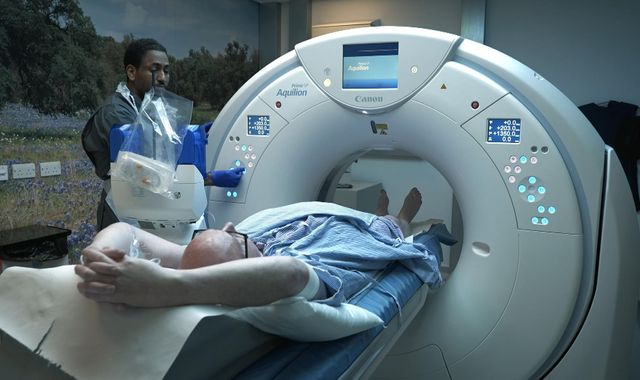Cancer innovation is saving lives - but NHS is struggling to meet rising demands
5 May 2024, 20:25 | Updated: 6 May 2024, 06:05

"The moment you have it yourself you hear it everywhere, but for something so prevalent it's not talked about at all," says Patrick Keane. His right arm is plugged into a tube that runs up to a bag of clear liquid in a treatment room at the Royal Free Hospital in north London, one of the UK's largest cancer treatment centres.
The 56-year-old's future is dependent on the slow drip of chemicals that attack the cancer cells in his body. If the tumour in his bowel can be reduced by chemotherapy, it can then be more easily surgically removed.
Returning to duties last week after his own diagnosis, the King chose to highlight innovations in cancer research and the thousands who like him are living under the shadow of the disease.
Patrick is one. Indeed, he got his cancer diagnosis in late January, around the same time as the King, and he is taking part in an innovative clinical trial that may help future patients.
In this election year, charities are calling on political parties to produce long-term plans for tackling the disease as part of their manifesto pledges. While innovation is saving lives, there is a looming budget shortfall.
Cancer Research UK, to whom the King became patron last week, estimates there will be a £1bn gap in research funding within the next decade. This is in part due to inflation combined with the cost of living crisis impacting donations to cancer charities.
Add to this that the number of us getting cancer is increasing, projected to go up by a fifth by 2040.
The Royal Free London NHS Trust, which receives the highest number of cancer referrals in London at 50,000 a year, has seen a 10,000 increase in referrals since 2019.
It's no surprise then that the NHS is missing targets for waiting times between urgent GP referrals and treatment.
Read more from Sky News:
'All men should have screening' says author Alex Wheatle
Netanyahu rejects Hamas ceasefire demands
Lord Of The Rings and Titanic actor Bernard Hill dies
One in two of us will get cancer and, as Patrick knows too well, that word opens up a world of uncertainty. "The word carries so much baggage with it," he says, and having it can send your mind to "some pretty dark places".
He talks frankly about the treatment and its side effects, which after his first two rounds, have been minimal. "I didn't have much of a head of hair to begin with," he jokes.
Some of his hair has gone in patches, but asked what the hardest thing has been, he doesn't hesitate: "My father passed away when I was 14. He died of cancer. I have 13-year-old twins so I couldn't initially shift the thought - is this going to happen again? Passing 48, the age that my father died was a key milestone for me. My children being older than I was when my father passed away was another one.
"Nobody expects their dad to die. It's a very unreal concept, and I'm not dying - but to try to have that conversation you know - 'things will be fine.' It's very treatable."
Two weeks after his third round of chemo, scans show the treatment has done its job, Patrick's surgery can go ahead and is due to happen later this month.
More survive cancer as technology advances
Cancer is more treatable now. More of us are surviving it because technology is advancing.
At the Royal Free that ranges from a new cutting-edge £8m PET scanner, which offers a faster more accurate diagnosis, to new drugs offering greater survival chances.
Lead cancer physician at the Royal Free, Roopinder Gillmore, told Sky News: "We are doing surgery quicker, more keyhole robotic surgery in this hospital. We do liver transplants for patients with primary liver cancer, we're trialling that out in other cancer types which is really exciting.
"We are doing more specialised radiotherapy and for me, my thing is drug treatments, and they are exponentially increasing in terms of what we can offer our patients. The big thing is immunotherapy, we didn't have that 15 years ago. It has completely changed the outlook for people with lung cancer and skin cancer."
Backlogs and waiting times have increased
But for all the advances, backlogs and waiting times have built up since the pandemic. The latest NHS figures show 64% of patients received their first treatment within 62 days of an urgent GP referral. The target is 85%.
That stretch on resources has a knock-on impact on patients like 29-year-old Beaux Harris.
Beaux, an actor and dancer who teaches at The Manor Dance Studio in north London, has what is called a mutated BRCA1 gene, which means her chances of getting cancer dramatically increase in her 30s.
She has a 60% chance of getting ovarian cancer and a 90% chance of getting breast cancer.
So she has decided to get a preventative double mastectomy and a hysterectomy but, due to the backlog, she has a long wait.
Turning to crowdfunding to go private
She says: "I feel like I've got a ticking timebomb on me - and it is terrifying. The truth is it doesn't really feel like a choice when you are presented with a figure like that - it's like saying would you get on a plane with a 90% chance of it crashing? I know I wouldn't."
She has been told that waiting times on the NHS for her preventative treatment is two years at the earliest.
She says people on her online support groups have waited five years. She's also been told there's a high chance the operation could be cancelled at the last minute if a high-demand cancer patient needs the slot.
"I could get timed out," she says. So, she is crowdfunding to get the £50,000 plus she needs to go private.
'I would love to be worrying about things that every other 29-year-old is worrying about'
She might need more funds if she wants some sort of normality at the end of it.
She says: "If I have a hysterectomy now, I can't have children. So, I'm also trying to raise money to freeze my eggs. Something that is offered on the NHS to cancer patients, but not to BRCA patients."
She certainly doesn't want to wait until she gets cancer. Ovarian cancer is known as the silent killer due to the difficulty in early detection.
Beaux's grandmother, her mother, and her aunt all died of cancer because of the BRCA1 mutated gene, she hopes to be the first female in her family in generations to survive having it.
"I would love to be worrying about things that every other 29-year-old is worrying about," she says. "I've got some bloody Olivia awards to win!"
Indeed, Beaux is using her talents putting on performances and doing tap dance sessions to raise money for her treatment.
In some ways it is taken for granted that, because it touches so many of us, most of the money raised for cancer research in this country comes from the British public, but charities say the government needs to play a bigger role in ensuring the UK continues to innovate and improve treatment for what remains the defining health issue of our time.
(c) Sky News 2024: Cancer innovation is saving lives - but NHS is struggling to meet rising demands













